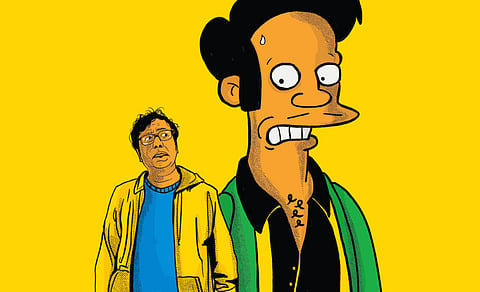Defending the Apu stereotype again? Maybe ‘The Simpsons’ has run its course
Asian Americans participate in the whole spectrum of society, far beyond the usual type-casting and there is no shame in being a convenience store clerk or a cab driver

Viewership of The Simpsons has declined steadily over the years, with last season’s ratings hitting an all-time low. But the show’s sharp satire has lived on in memes on social media that serve as still-relevant social commentary. One shows the oblivious Principal Skinner asking himself, “Am I out of touch?” before concluding, “No, it’s the children who are wrong.” It was a good fit for the fumbling Democrats in 2016, among other things.
It has now come a full circle. Principal Skinner’s lament is a perfect summary of the state of The Simpsons itself. The show has finally responded to the growing tide of criticism it has faced for its character Apu, the Indian immigrant owner of the local convenience store, the Kwik-E-Mart.
Like most Americans, I’ve become very familiar with Apu over the years. But in my case, as a Pakistani American, it wasn’t just seeing him on screen — it was being called Apu in locker rooms, being mistaken for the clerk in convenience stores, hearing people mock my family’s accents by saying, “Thank you, come again!”
In last Sunday’s episode, Marge reads Lisa a bedtime story that she strips of all offensive — or as we might be more likely to say today, “problematic” — content. Bored by a narrative with no conflict, Lisa concludes that “there’s no point to the book”. Breaking the fourth wall, she says straight to camera, “Something that started decades ago and was applauded and inoffensive is now politically incorrect.” Cue a pan over to a framed picture of Apu. The episode was well received by right wing-commentators as a volley in the culture war against political correctness.
But this anachronistic racial caricature has begun to look, like the hapless Principal Skinner, increasingly out of touch. The situation came to a head last year, with Indian American comedian Hari Kondabolu’s documentary, The Problem With Apu. It’s surprising that the show’s writers addressed the controversy at all, and even more so that they did it as hamfistedly as they did. Lisa’s statement applies to a range of cultural practices we now universally acknowledge as harmful, from China dolls to minstrel shows.
Originally noted in creator Matt Groening’s script as “NOT INDIAN”, the owner of the Kwik-E-Mart became Apu when the voice actor Hank Azaria performed the part with a comical accent at a line reading. Though the show always maintained ironic distance from its themes, the line between satirising a stereotype and perpetuating it is not always clear. In Kondabolu’s film, he speaks to the former Simpsons writer Dana Gould, who says that “there are accents that by their nature, to white Americans, I can only speak from experience, sound funny”. The joke was too hard to resist, even if it was only funny to one ethnic group.
It’s sometimes said that all the characters on The Simpsons are stereotypes. But not all demographics are on equal footing in America. An oft-cited counter-example is Groundskeeper Willy, the eccentric Scottish outdoor supervisor of Springfield elementary school. But it’s safe to say that American culture has not yet had an Indian Braveheart or Sean Connery.
Still, it’s getting better. South Asians in America are more visible than ever before. Once consigned to being cab drivers or terrorists, they are now represented by the likes of Kumail Nanjiani, Mindy Kaling, British transplant Riz Ahmad and crossover Bollywood star Priyanka Chopra.
For many Indian Americans, Kondabolu spoke to, Apu is a thing of the past. “I hate Apu,” says actor Kal Penn, “and because of that I dislike The Simpsons.” (Kondabolu, it’s worth mentioning, does not dislike The Simpsons, and neither do I.) Penn was partly responsible for a great step forward in South Asian representation. His performance in Harold and Kumar Go to White Castle may have been the first time an Indian American played not a cab driver, terrorist, or convenience store clerk, but a genial young pothead.
Like most Simpsons writers, the creators of Harold and Kumar were white guys, Jon Hurwitz and Hayden Schlossberg. Hurwitz told the Washington Post that, growing up in New Jersey, their friends included, “Asian guys, Indian guys, black guys, and they were all very much like ourselves. But whenever we watched movies, we never saw our world portrayed on-screen.”
They’re right: Asian Americans participate in the whole spectrum of society, far beyond the usual stereotypes. There is no shame in being a convenience store clerk or a cab driver — working people of all races are three-dimensional human beings, in all their complexity. But Apu is two-dimensional, and his presence has led Americans to see real people the same way.
The Simpsons is classic Americana, and I owe a lot to it for influencing my sense of humour and scepticism. But it does no one any favours to pump life into it long after brain death. As Kondabolu tweeted after the hate mail he received in the wake of his documentary: “The Simpsons always critiqued pop culture, mocked hypocrisy & went after broken institutions. I LEARNED FROM THE BEST.”
— Guardian News & Media Ltd
Shuja Haider is a journalist and editor of Viewpoint magazine.



